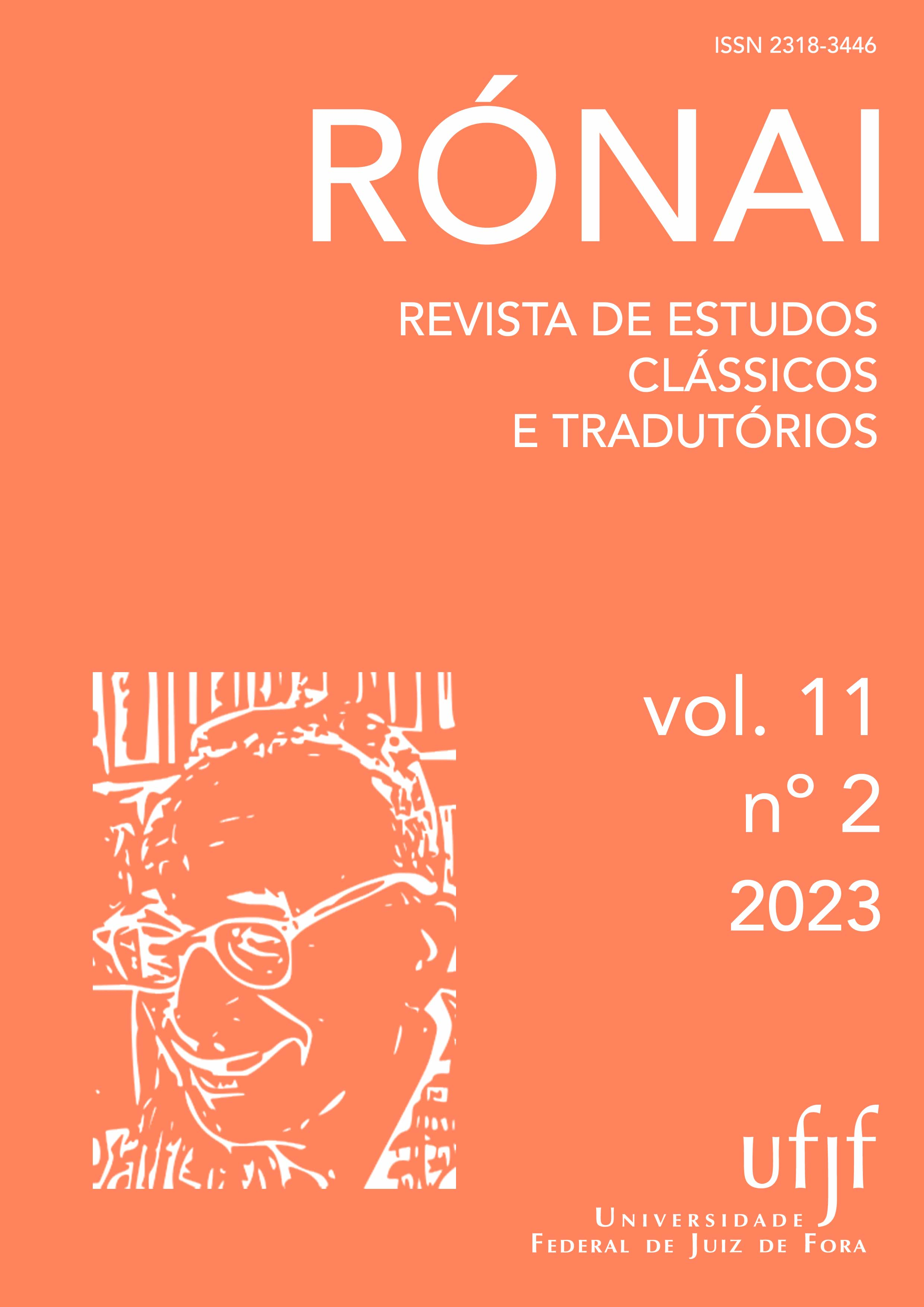The baptism of Probus (Acts of Xanthippe, Polyxena, and Rebecca, XXI): a translation and commentary
DOI:
https://doi.org/10.34019/2318-3446.2023.v11.42018Palabras clave:
Acts of Xanthippe, Polyxena, and Rebecca, Ancient Novel, Greek fiction from the Imperial PeriodResumen
The narrative of the baptism of Probus marks the end of the first part of the plot of the Acts of Xanthippe, Polyxena, and Rebecca, a Christian novel written in Late Antiquity. This is an important passage for establishing the date of composition, with a possible intertextual relationship and a non-dictionary term, which may indicate an error in the passage from uncial to minuscule manuscripts. The purpose of this article is to present the translation of this passage (Acts of Xanthippe, Polyxena, and Rebecca, XXI) and a discussion of the relevant items for establishing the date of the composition, as well as briefly introducing the work to contextualize the study.
Descargas
Citas
BONNET, M. Sur les actes de Xanthippe et Polyxène. The Classical Review, v. 8, n. 8, p. 336-341, 1894.
BURRUS, V. Desiring Women: Xanthippe, Polyxena, Rebecca. In: JOHNSON, S.; DUPERTUIS, R. R.; SHEA, C. (eds.). Reading and teaching ancient fiction: Jewish, Christian, and Greco-Roman narratives. Atlanta: SBL Press, 2018. p. 9-27.
CRAIGIE, W. A. Life and Conduct of the Holy Women, Xanthippe, Polyxena, and Rebecca. In: SCHAFF, P. (ed.). The Ante-Nicene Fathers, vol. 9. New York: Scribner’s Sons, 1899, p. 369-389. Disponível em: www.ccel.org/ccel/schaff/anf09.pdf. Acesso em: 04 abr. 2020.
DUARTE, A. da S. Dez textos para conhecer o Romance Antigo. In: FARIA, J. R. (ed.). Guia bibliográfico da FFLCH. São Paulo: 2016 [8 p.]. Disponível em: https://www.fflch.usp.br/files/2017-11/Romance%20antigo.pdf. Acesso em 11 abr. 2020.
EASTMAN, D. L. Life and Conduct of the Holy Women Xanthippe, Polyxena, and Rebecca. In: BURKE, T.; LANDAU, B. (eds.). New Testament Apocrypha: More Noncanonical Scriptures, Volume 1. Grand Rapids, MI: Eerdmans, 2016, p. 416–452.
HOLZBERG, N. The Ancient Novel: an introduction. London: Routledge, 2005.
HUNINK, V. Vrouwen naast Paulus, twee romans uit het vroege christendom. Budel: Damon, 2013, p. 53-110.
IPIRANGA JR., P. O romance antigo: teorização e crítica. Eutomia: Revista de literatura e linguística, Recife, v.1, n. 14, p. 45-65, dez. 2014. Disponível em: https://periodicos.ufpe.br/revistas/EUTOMIA/article/view/726. Acesso em: 09 mai. 2020.
JAMES, M. R. Apocrypha Anecdota: A Collection of Thirteen Apocryphal Books and Fragments. In: Texts and Studies: Contributions to Biblical and Pa-tristic Literature, vol. 2, no. 3. Cambridge: University Press, 1893. p. 58-85. Dis-ponível em: https://archive.org/details/apocryphaanecdot00jame/page/58/mode/2up. Acesso em 03 mar. 2021.
JUNOD, E. Xanthippe et Polyxène: Un roman chrétien. Turnhout, Belgium: Brepols, 2023.
KONSTAN, D. Reunion and Regeneration: Narrative Patterns in Ancient Greek Novels and Christian Acts. In: KARLA, G.A. (ed.). Fiction on the Fringe: Novel-istic Writing in the Post-Classical Age. Leiden: BRILL, 2009, p. 105-120.
KONSTAN, D.; RAMELLI, I. The Novel and Christian Narrative. In: CUEVA, E.; BYRNE, S. (eds.). A Companion to the Ancient Novel. Malden/Oxford: Wiley/Blackwell, 2014, p. 180-198.
MALHADAS, D.; DEZOTTI, M. C. C.; NEVES, M. H. de M. (org.). Dicionário Grego-Português. 5 vols. Cotia, SP: Ateliê Editorial, 2006-2010.
PAROSCHI, W. Origem e Transmissão do Texto do Novo Testamento. Barueri, SP: Sociedade Bíblica do Brasil, 2012.
PERVO, R. Dare and Back: The Stories of Xanthippe & Polyxena. In: RAMELLI, I.; PERKINS, J. (eds.). Early Christian and Jewish Narrative: The Role of Reli-gion in Shaping Narrative Forms. Tübingen: Mohr Siebeck, 2015, p. 161-204.
PROENÇA, E de; PROENÇA, A. O. de (org.). Um outro testamento: atos apos-tólicos. São Paulo: Fonte Editorial, 2022.
Descargas
Publicado
Cómo citar
Número
Sección
Licencia
Derechos de autor 2023 Fernando Pavão

Esta obra está bajo una licencia internacional Creative Commons Atribución 4.0.
Derechos de autor
Los autores que publican en esta revista aceptan los siguientes términos:
1. Los autores y las autoras conservan los derechos de autor y le otorgan a la revista el derecho a la primera publicación, que está bajo la licencia Creative Commons Attribution License 4.0 Internacional.
2. Los autores y las autoras pueden publicar y compartir el trabajo con reconocimiento de la publicación inicial en esta revista.
3. Los autores y las autoras de las obras aprobadas autorizan a la revista a asignar el contenido de sus obras, después de la publicación, para su reproducción en indexadores de contenido, bibliotecas virtuales y similares.
Para obtener más información sobre Creative Commons Attribution License 4.0 Internacional, acceda a: https://creativecommons.org/licenses/by/4.0/deed.es
Exención editorial
El contenido de los artículos publicados es responsabilidad única y exclusiva de sus autores, y no representa la posición oficial de Rónai - Revista de Estudos Clássicos e Tradutórios o de la Faculdade de Letras de la Universidad Federal de Juiz de Fora o instituciones asociadas.



